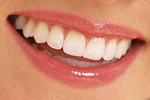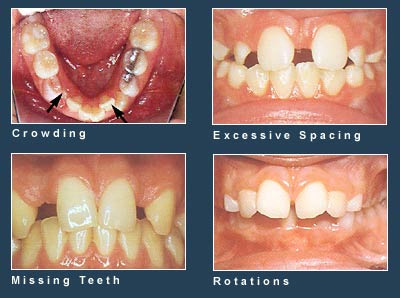
The Perfect Smile
Have you ever given any thought to what it actually means to have a “perfect” smile? Most people when asked this question will conjure up mental images of models and Hollywood actors with dazzling teeth. However, there is an actual medical definition of the way the teeth are meant to fit together. The word “occlusion” refers to the alignment of the teeth and the way the upper and lower teeth fit together (bite). Ideally, all upper teeth fit slightly over the lower teeth, just like the top of a house sits over a basement. All teeth are lined up straight and spaced evenly. The upper teeth keep the cheeks and lips from being bitten and the lower teeth protect the tongue. Not all people are so lucky as to have this medically “perfect bite.”
There are any many problems that can lead to a malocclusion, or “bad bite”. For example, crowding of teeth, too much space between teeth, extra or missing teeth, cross-bite, over-bite, and under-bite are all types of malocclusions. Also, various irregularities of the bone structure in the jaws and face can also lead to a malocclusion. Basically, a malocclusion is any misalignment of the teeth or incorrect relationship between the teeth of the two dental arches.
Most forms of malocclusion are inherited; meaning you were born with them through no fault of their own. In addition, thumb sucking and tongue thrusting can also create a malocclusion over time. Premature loss of baby or permanent teeth, accidents, or medically related issues such as allergies or breathing problems can also cause a bad bite.
Most people have some degree of malocclusion, although it usually is not enough to warrant orthodontic treatment. However, those with serious enough problems left untreated, malocclusions or poor bites can become worse. Crooked and crowded teeth are difficult to clean with normal brushing and flossing causing tartar and plaque buildup. This build-up, in turn, can lead to gum disease and tooth decay. Also, a bad bite can wear down the enamel on tooth surfaces and create difficulty chewing and may eventually lead to chronic pain over time.
Malocclusions of one type or another are the main reason that people seek orthodontic treatment. Given all of the negative consequences just described, it is no wonder people want to get the problem “straightened out”. If you think you have a malocclusion, contact Dr. Samuel Papandreas at Papandreas Orthodontics in North Royalton OH to schedule a complimentary consultation before the situation goes from crowded to worse!

